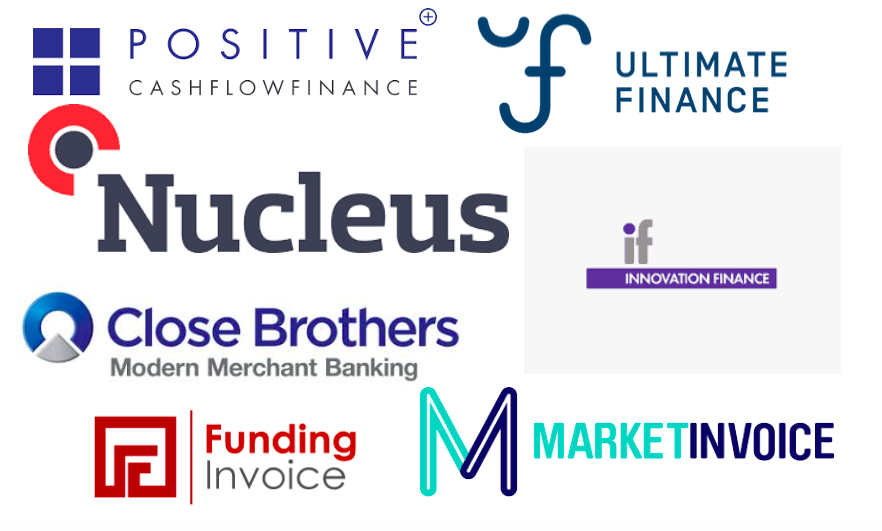Delayed invoice payments can have a significant impact on a business’s cash flow, and thereby its productivity and future growth. Thankfully, many in the industry have started to develop effective ways to help other businesses stay afloat with invoice finance troubles, offering up to 80% of your invoice value upfront (or higher).
Below are our top 10 invoice companies in the UK:
1. Funding Invoice
Funding Invoice is a service helping business owners to keep on top of their finances, particularly those who are struggling with delayed invoice payments. The invoice finance company does this by providing small loans to business with delayed invoice payments. The loan amount given to the business will correspond with value of the delayed invoice, with Funding Invoice taking a small percentage fee from these invoices once paid through.
As the company is aimed primarily at helping small businesses who struggle to keep up when an invoice payment is delayed, the fee charged by Funding Invoice is a significantly small amount. Funding Invoice allows businesses to apply of any sum of money, with a range of 70 to 85% of the invoice being covered by the invoice finance providers upfront. Invoice Finance has made a significant impact on businesses throughout the UK seeking financial support.
2. Close Brothers

Close Brothers is a leading UK finance company that is a modern merchant bank who caters their services to their customer’s needs. Close Brothers Group of businesses are all within the finance sector and they state that their business is underpinned by traditional values and ethical approach to lending. They are ranked one of highest rated banks in the UK based on Moody’s bank ratings.
They offer a range of invoice financing services which include invoice factoring, invoice discounting and asset-based lending to support businesses to unlock the capital that is tied up in their sales invoices and assets.
3. Market Invoice

Market Invoice offers two types of invoice financing which are contract finance and invoice discounting. Contract finance allows you to release the value of your contracts through their online bidding system which can offer some of the value of the contract within 24 hours or the same day.
Market Invoice’s invoice discounting services offers a range of solutions that offer different contract lengths which include selective invoice discounting for one-off or occasional services with a choice of no contract or 12-month contract. Invoice discounting will give you access to up to 90% of your invoice values quickly and you can monitor your services through their online portal.
4. Bibby Financial Services

Bibby Financial Services has a range of invoice finance services which include Forward Finance that is designed to help new and small businesses that need funding to help them develop and grow. To be eligible for Forward Finance your business needs to have a turnover under £300,000.
Bibby Financial Services also offers invoice factoring and invoice discounting. These invoice finance services are suited to small businesses that have customers with longer payment terms that need to plug a cashflow funding gap. These services can release up to 90% of the invoice value within five days of your initial application and within 24 hours once set up.
5. Innovation Finance
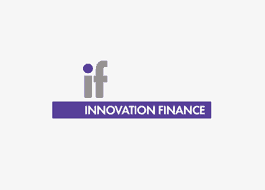
Innovation Finance offers a range of invoice finance options which include invoice factoring, invoice discounting and bad debt protection. Their bad debt protection allows you to select either key customer accounts or the whole sales ledger for coverage as part of your invoice finance package.
You can choose between invoice factoring or invoice discounting which offer different services to cater for differing needs. Invoice factoring offers a complete invoice management service where they will manage your sales ledger and collect your unpaid invoices. Invoice discounting is more discrete and lets you retain control of your customer accounts.
6. Ultimate Finance
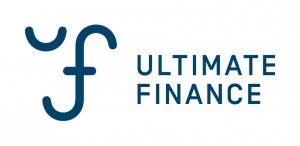
Ultimate Finance offers invoice finance that can be flexible to your business needs. They offer full sales ledger management where they manage the collection of payments from your customers. Ultimate Finance services generally involve them contacting your customers to collect payments but if you want the service to remain unknown then they can offer a confidential service.
Ultimate Finance charges a service fee and a discount fee which is like an interest rate fee. They offer a no-contract service at competitive prices which allows you to access up to 95% of your invoice values.
7. IGF Invoice Finance
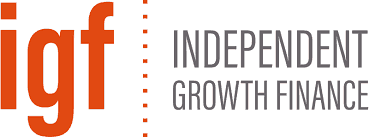
IGF Invoice Finance is a financial services provider that offers working capital solutions to assist small to medium-sized business to accelerate their growth. They offer invoice finance and asset-based finance solutions that are tailored financial solutions to suit their clients’ needs.
IGF invoice finance solutions offer both invoice factoring and invoice discounting services that provide up to 90% of the value of your unpaid invoices at the point you raise your invoices. IGF‘s invoice factoring service gives its customers access to funding and also assists them by taking over their credit management and collecting their payments. Invoice discounting is more discrete and the clients retain control of their accounts.
8. Nucleus Comercial Finance

Nucleus Commercial Finance is a financial services business that provides a wide range of products which include invoice finance, cash flow finance, business cash advance, asset-based lending, and construction finance.
Nucleus Commercial Finance’s invoice finance offering includes invoice discounting. Their invoice discounting service releases funds that are tied up in unpaid invoices and allows you retain control of your customer accounts and payment collection. They offer to release up to 100% of the funding tied up in your unpaid invoices of a value between £100,000 and £50 million. Nucleus charges a percentage on the transaction that varies depending on your agreement.
9. Catalyst Finance
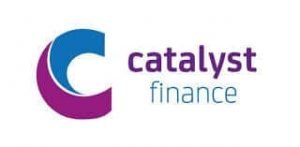
Catalyst Finance is a smaller financial services provider who offers services that target small to medium businesses and was set up to specifically cater for this sector and their need to access finance for short periods of time to help cash flow. They aim to provide financial solutions that enable SMEs to access funding when needed, quickly, pay only for the period that they borrow the money for, without signing up to long-term contracts.
Catalyst Finance’s invoice finance solution offers invoice discounting service that can be confidential if required but either way you will retain control of your credit control and customer accounts.
10. Positive Cashflow Finance

Positive Cashflow Finance is an experienced financial services business that is part of 1pm plc. They offer a full range of financial solutions which include business loans, bridging finance, commercial mortgages, invoice finance, vehicle and asset finance. Positive Cashflow Finance’s solutions cater for smaller business, new business start-ups, and established larger businesses.
Positive Cashflow Finance offers two invoice finance solutions which are invoice factoring and invoice discounting. Their invoice factoring service is called disclosed invoice finance which also offers comprehensive credit control service. Their invoice discounting service provides a confidential service that allows you to stay in control of your customers’ accounts and credit control.
What is invoice finance?
Invoice finance allows you to get an advance on your unpaid invoices. Your business may rely on short term cash flow in order to meet its orders (think fashion, construction and catering jobs). By showing proof of your invoices and orders to a lender means that you can access up to 80% of the cash and repay when your invoice has been settled.
In today’s world, there are numerous financing solutions available to SMEs outside of the traditional banking system. One of which is invoice trading which can be a great option for high-growth SMEs that feel like they are continually waiting for payment and are missing out on growth opportunities as a result.
Although invoice finance has been around in its more traditional forms for years, it has sometimes been associated with only being used by struggling businesses. However, this has changed in recent years where businesses have started to really unlock the power of invoice finance to fuel their growth.
Invoice financing is a general term used whenever a third party agrees to buy a business’ unpaid invoices. Invoice financiers can be a specialist independent company, a bank, or, more recently, a fintech lender. As a company issues an invoice to its clients, an invoice finance provider will advance a percentage of the invoice’s value upfront, and the balance when payment is received, less fees.
Within invoice finance, there are three branches; factoring, invoice discounting and invoice trading. Funding Invoice specialises in the latter and offers a fast, affordable and transparent method of raising working capital.
What is the invoice finance industry worth?
The value of the invoice finance industry in the UK is £17.9bn, which makes up 80% of the total amount of lending through asset based finance of £22.2bn, by end of Dec 16. (Source: ABFA)
How will invoice finance help my business grow?
Cash flow is a big concern for most fast-growing companies that have not yet built up significant cash reserves. Future growth can be stunted as it is difficult to fulfil new potential contracts whilst still waiting for payment from already delivered goods/services.
Invoice finance can unlock capital due to companies as soon as they raise an invoice, making it much easier to pay suppliers, rent, and wages on time. Simply, invoice finance can bridge any cash flow gaps, allowing you to fund sales growth and business expansion.
Who uses invoice finance?
All businesses may benefit from the use of invoice finance! It can be a very smart way for small businesses to manage their cash flow from the outset. In total, over 45,000 small businesses use invoice finance as a funding option. It can be difficult for smaller businesses to secure bank loans without personal assets to pledge, however the great thing about invoice finance is a strong debtor book is all you need. Funding Invoice’s customers range from very young fashion start-ups to engineering companies with £7 million turnover.

How can invoice finance benefit different industries?
What affects a company’s cash flow can be very industry specific. The flexibility of invoice trading allows it to adapt to a range of different industries.
For example:
Construction – Invoice finance gives companies access to the cash needed for setting up new contracts on larger projects. These funds would then be crucial for investing in both the materials and the staff required before beginning any new jobs.
Wholesale – Invoice finance allows companies to take on orders from new suppliers whilst still waiting for payment from their current customers, and help secure favourable supplier discounts.
Recruitment – Invoice finance makes it easier to meet weekly/monthly payroll, and allows companies to not be strangled by restrictive contracts.
Film/TV – Invoice finance gives production companies the cash they need for large projects upfront rather than wait months for completion!
Manufacturing – Invoice finance allows companies to pay suppliers on time, afford the costs of larger jobs which may have historically been turned down, and invest in new machinery to help company growth
What is the difference between invoice factoring and invoice trading?
- Invoice factoring – hand over all your invoices, whole sales ledger and the lender will chase customers for settlement
- Invoice trading – based on a pay-as-you-go individual invoice you choose and the borrower is responsible for chasing up unpaid invoices
The most well-known form of invoice finance is factoring where a factoring company purchases a business’ invoices. A factoring company would usually require a business to sell all of the invoices that it issues. This may be unsuitable for many growing customers who only want to receive funding against a few invoices on an ad-hoc basis. As a result, many small businesses turn to invoice discounting or invoice trading as they need the extra flexibility when it comes to their working capital.
Also, factoring providers usually require that businesses sign up to 12 month contracts which usually come with arrangement fees, monthly service fees and hefty late fees.
Invoice trading, on the other hand, offers a ‘pay-as-you-go’ service where businesses can raise finance against individual invoices rather than having to sell their whole debtor book. This means an SME can pick and choose which invoices are financed which may mean a lower overall cost of finance. Usually, a business using invoice trading wouldn’t be contractually locked-in to a provider which means that they are free to switch to other invoice trading firms to benefit from the best price and service levels.
However, invoice trading companies such as Funding Invoice aim for a much higher degree of confidentiality. In fact, Funding Invoice leaves its customers to chase payment of their own invoices so as not to get unnecessarily involved in the business relationship between our customer and their debtor.
How does invoice trading work?
• A business completes an application form, providing recent company financial documents
• Once approved, the company can upload an invoice onto the invoice trading platform
• The invoice is then verified by the invoice finance company
• Once verified, the invoice is then made available for investors to purchase
• The business then receives an advance of up to 85% within 24 hours
• The debtor then pays the invoice into the invoice finance company’s account, the balance is then sent to the business, less fees
How much invoice finance can you borrow?
There doesn’t seem to be a standard industry limit in this area as each provider has their own lending limits. How much a provider lends is linked to the turnover of the company, for example, at Funding Invoice we’re willing to lend up to 20% of the business’ turnover, which could run in the £10,000s, £100,000s or £1,000,000s.
There are many factors which can influence the amount of finance you can unlock from your outstanding invoices. It normally depends on your revenue and the strength of your debtor book. Most providers typically advance 75-80%, however, advance rates often increase with a good track record.
How much does it cost?
The costs of invoice finance are dependent on the revenue of your business, how long you need funds for, the creditworthiness of your customer, and your provider. Providers can vary a lot in the way they structure their fees. With Funding Invoice, there are no hidden costs – you know exactly how much you’ll be paying before you raise finance against an invoice. This is typically between 2-3% of the invoice’s value.
What happens if a customer doesn’t pay?
If a customer does not pay an invoice, it is the business’s job to try and reclaim the monies owed. If after a prolonged period payment cannot be collected, it is up to the business to repay back the debt. Some providers offer a ‘without-recourse’ service at an extra cost, this protects businesses against non-payment as the provider will cover the payment.
What is the peer-to-peer aspect of invoice trading? Can I get involved?
Invoice trading platforms serve as a marketplace matching growth SMEs with investors. Through the platform investors can fund parts of the available invoices, thus granting them access to a secured asset which was previously only available to banks and factoring companies. The great thing about these platforms is the attractive 8-12% annual returns they offer. Invoice trading platforms are only able to work with high net-worth, sophisticated or institutional investors, so if you’re able to self-certify that you belong to one of these categories then this high-yield, secure, and liquid product is open to you!


